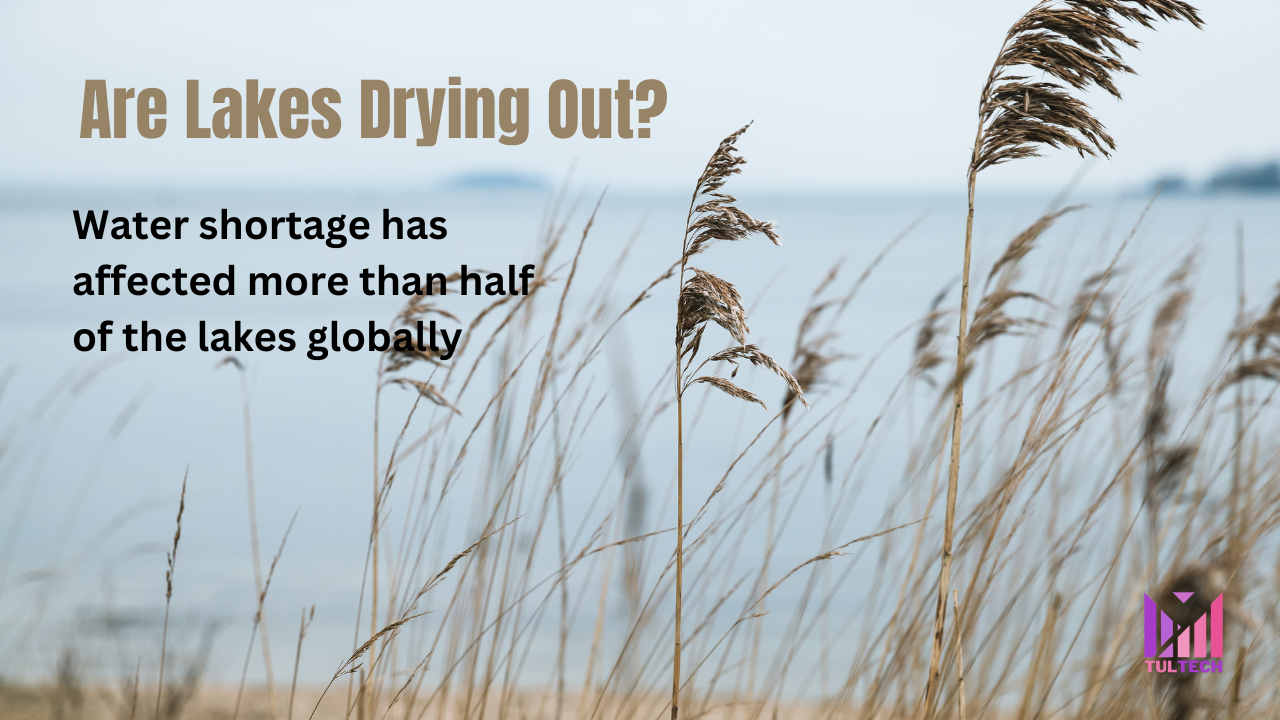Announcements
No announcements yet
New blog posts

Completion of Workshop on Water Recling Simulation and Modelling: Unlocking the Future of Water Management
19 March, 2024 by Charlotte Lee
We are thrilled to announce the successful...

IJITIS Journal Meeting and SWOT Analysis at TULTECH
15 January, 2024 by Charlotte Lee
Greetings, TULTECH community! In our...

A Milestone Meeting for EIL: Shaping the Future of Environmental Industry Letters
15 December, 2023 by Charlotte Lee
Dear TULTECH Community, We are delighted to...
Weather

-4°C
Calendar of Events
More than half of the lakes around the world are loosing water
Posted on 26 June, 2023 by benyamin chahkandi

Summary: A recent study found that 53 percent of the greatest freshwater lakes on earth are in decline and are now retaining less water than they did thirty years ago. The study measured changes in water levels in roughly 2,000 of the largest lakes and reservoirs in the globe using satellite measurements spanning decades. It was discovered that human consumption, sedimentation, and climate change are to blame.
However, the lead author, former CIRES visiting fellow and current climate fellow Fangfang Yao, claimed the news is not wholly bad. With this novel technique for observing patterns in lake water storage and the causes behind them, scientists can inform communities and water managers on how to better safeguard vital water sources and significant local ecosystems.
According to a variety of satellites and models, this is the first thorough analysis of the trends and factors influencing global lake water storage fluctuation, Yao added.
The environmental catastrophes affecting some of the greatest bodies of water on Earth, such the drying up of the Aral Sea between Kazakhstan and Uzbekistan, inspired him to conduct the research.
In order to assess changes in water levels in over 2,000 of the largest lakes and reservoirs on Earth, which account for 95% of all lake water storage, he and colleagues from the University of Colorado Boulder, Kansas State University, France, and Saudi Arabia developed a system.
To measure and identify trends in lake storage globally, the researchers coupled models with observations gathered over three decades from a variety of satellites.
Freshwater lakes and reservoirs are an important resource for both people and Earth ecosystems since they store 87 percent of the world's freshwater. Lakes are less closely inspected than rivers, but they nonetheless supply more people with water than rivers do.
Although they are valuable, long-term patterns and fluctuations in water levels have mostly remained a mystery up until now.
According to co-author and CIRES fellow Balaji Rajagopalan, "We have pretty good information on iconic lakes like the Caspian Sea, Aral Sea, and Salton Sea, but if you want to say something on a global scale, you need reliable estimates of lake levels and volume." By using this innovative approach, "we are able to provide insights into global lake level changes with a broader perspective," the researchers write.
In order to survey the area of 1,972 of the largest lakes on Earth for the current paper, the scientists used 250,000 lake-area pictures taken by satellites between 1992 and 2020. They used long-term water levels to lessen any ambiguity and collected water levels from nine satellite altimeters. They used most recent water measurements taken by more modern sensors on satellites for lakes lacking a long-term level record. Scientists were able to reassemble the volume of lakes that date back decades by fusing more recent level observations with longer-term area measurements.
The findings were startling: 53% of lakes worldwide saw a decrease in water storage. The size of the United States' largest reservoir, Lake Meads, is used by the authors to compare this loss to.
The researchers made use of recent developments in water use and climate modeling to explain patterns in natural lakes. According to Yao, the global net decline in natural lake volume and water losses in about 100 large lakes were primarily caused by climate change and human water consumption. And many of the impacts of human activity and climate change on lake water losses were previously unrecognized, such as the desiccation of Lake Mar Chiquita in Argentina and Lake Good-e-Zareh in Afghanistan.
Both rainy and dry regions of the world are losing volume in their lakes. The losses in Arctic lakes and humid tropical lakes point to more pervasive drying trends than was previously thought.
Yao and his coworkers evaluated reservoir storage trends as well. They discovered that significant water losses occurred in nearly two-thirds of the planet's large reservoirs.
24 percent of the world's lakes showed notable gains in water storage even while the majority of lakes are declining. In the Northern Great Plains of North America, the Inner Tibetan Plateau, and regions with new reservoirs like the Yangtze, Mekong, and Nile river basins, growing lakes are more common.
According to the authors, around 2 billion people, or about one-quarter of the world's population, live in the basin of a drying lake, demonstrating the urgent need to incorporate human consumption, climate change, and sedimentation consequences into sustainable water resources management.
According to Livneh, their research also sheds light on potential solutions. We can adjust and investigate new regulations to reduce large-scale decreases if human consumption is a significant contributing cause to the decline in lake water storage.
In one of the lakes the team analyzed, Lake Sevan in Armenia, water storage has increased over the past 20 years, which the authors attribute to the implementation of water conservation rules beginning in the early 2000s.
Event Categories
Past Events
Workshop on Artificial Intelligence Applications in Smart Cities
20 August, 2024
Workshop on Advanced Water Treatment Processes
10 July, 2024
Workshop on Water Recycling Simulation and Modelling
15 March, 2024Today In History
Here are some interesting facts ih history happened on 22 February.





